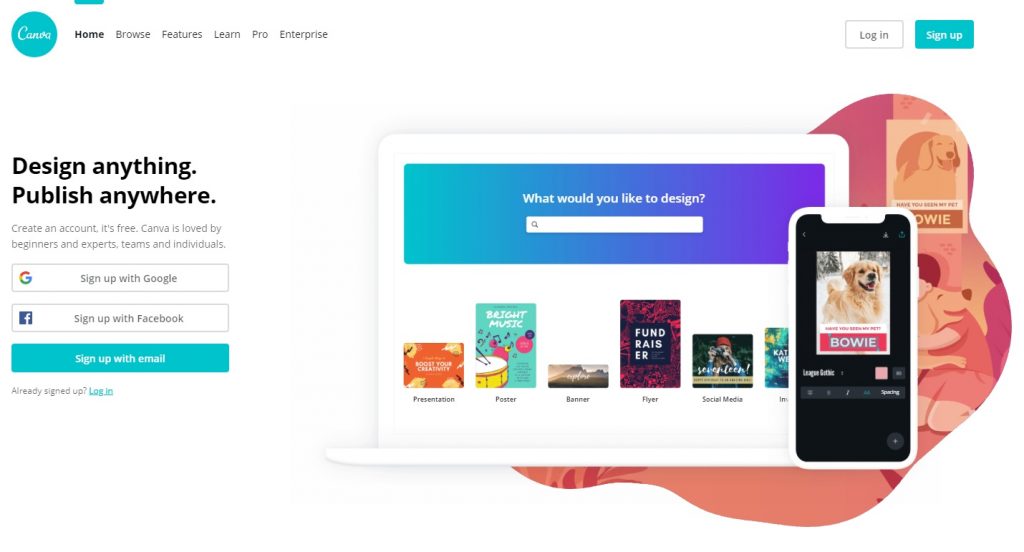5 Best Tools for E-commerce in 2020 [Must Read for New Seller]
Canva
SMEs are competing with larger, well-established, and better-resourced companies who have in-house design teams and what seems like an unlimited marketing budget.
Fortunately, the development of graphic design software like Canva has helped reduce these barriers. Small E-commerce businesses can now create branding and marketing tools that are visually stunning just like the big wigs but on a shoestring budget!

Canva is an easy to use graphic design tool, even for novices which offer the whole enchilada. From presentations to documents to invitations to marketing material to header templates to social media images, you will find just about anything that you need! Simply search for the image you want and, in the process, discover a whole lot more. You can even edit images and the look with the help of setting like brightness, tint, filters, and other settings.
People who do business online use the Facebook app for a variety of reasons. In the year 2020, Facebook is still a great place to advertise sales, boost brand awareness, and respond to questions quickly on your business’s fan page. With this app, you can easily offer online customer service by responding to comments, whether they are negative or positive. Keeping customers engaged is the name of the game in building brand loyalty in the competitive e-commerce business landscape which makes you win the long term.

Mailchimp
MailChimp is an incredible tool that helps businesses small or big to create and automate successful email campaigns easily.
Not only is their reporting fantastic, but it also gives insight into everything that you need to know about your list of subscribers and its performance.
The best part is it’s ‘forever free’ plan, which is 100% free for up to 12,000 emails in a month and 2000 subscribers. This is a great deal for small businesses, especially when you are trying and testing new tools.

Other contributing factors to make it a popular platform are an easy to use interface with amazing tools and great support. In addition, you can find customizable email templates, simple tracking instruments, contacts segmentation into groups, voicemails, and analytics on the MailChimp. Using these tools, you can customize the time you want your email to be sent based on a user’s location.
Google Analytics
A free Google tool that your small business should use from the start, at a basic level, is Google Analytics. It helps you check who’s coming to your website, where they’re coming from and where they spend the majority of their time. Beyond that, you can track events and learn about user engagement, build an enhanced eCommerce setup, and set up goals to track conversions.

Google Analytics can quickly become the best friend of any small business which helps track the loads of data and content that’s uploaded.
To break it down for you, Google Analytics is one feature that you have got to install for your website. From recording and analyzing just about anything to measuring engagement on-site to analyze real-time data and unique visitors to track what works for you and what doesn’t, this tool does it all. It’s unimaginable, the number of metrics you get at absolutely zero cost.
HootSuite
There is no denying the power of social media for established and upcoming businesses. However, updating your company’s Facebook, Twitter, Instagram, YouTube, and LinkedIn pages can require a lot of time which can be utilized into doing something else. With Hootsuite, you can update all these social media sites in one go without logging into each of the individual platforms. This is an amazing social media management app that helps in scheduling every post you plan for next week, month or even 3 months. The software automatically posts content at your specified time.

